The War To End All Wars - A UK MP AAR using the World War One mod
- Thread starter Poach
- Start date
-
We have updated our Community Code of Conduct. Please read through the new rules for the forum that are an integral part of Paradox Interactive’s User Agreement.
You are using an out of date browser. It may not display this or other websites correctly.
You should upgrade or use an alternative browser.
You should upgrade or use an alternative browser.
Britain player needs to reconsider that "Fortress Britain" includes Ireland!
Any effort to invade Ireland will require breaking through the Channel or going over the top of Scotland, both of which are guarded by the majority of my Battleship units. I would see those slow moving transport ships sailing past my coastlines and the resulting battle would cost the Kaiserlich Marine dearly and net them a strategically insignificant island: I can easily blockade Ireland while I amass a large attack force to retake it. As the Russian report suggests I'm not committed to action yet because of the Central Powers' "Russia First" strategy: the projected need for British soldiers in France simply did not materialise, and as such the BEF is idle.
I can't get them to Russia without either somehow retaking Denmark, which requires a land campaign against Germany and thus is unlikely, or defeating the Ottoman Empire, which is a war in itself.
So in short I'm not short on soldiers to throw against any fancy German sea adventures.
Any effort to invade Ireland will require breaking through the Channel or going over the top of Scotland, both of which are guarded by the majority of my Battleship units. I would see those slow moving transport ships sailing past my coastlines and the resulting battle would cost the Kaiserlich Marine dearly and net them a strategically insignificant island: I can easily blockade Ireland while I amass a large attack force to retake it. As the Russian report suggests I'm not committed to action yet because of the Central Powers' "Russia First" strategy: the projected need for British soldiers in France simply did not materialise, and as such the BEF is idle.
I can't get them to Russia without either somehow retaking Denmark, which requires a land campaign against Germany and thus is unlikely, or defeating the Ottoman Empire, which is a war in itself.
So in short I'm not short on soldiers to throw against any fancy German sea adventures.
Probably a bit of an oversight. Does the WW1 mod model the disconent in Ireland at the time? If not, then it seems a sound military move if abusrdly ahistoric. The British seemed especialy jumpy about the Germans in Ireland, so it seems almost funny to see it totaly ungarrisoned.
Also, does the WW1 mod add any espionage featuers? Because a nicely timed armed uprising across Ireland would serve you right :laugh:
Irish discontent is not in the game, no. All I've done is finish where the original team left off in terms of tech and balance. Once the actual core of the game works well I'll look at potential flavour events.
Armed uprisings are poorly implemented in HoI3 anyway. The militia divisions that rebellions spawn are quickly and easily put down: I'd only need a cavalry division sitting in Ireland and every rebel division that popped up would be swiftly put back down.
Though in fairness also not represented in HoI3 at all are police forces or soldiers back home. Soldiers rotated as you know, only spending so long on the front before returning home to other duties as a break. As such even though there are no HoI3 Divisions in Ireland, HoI3 Divisions only represent deployed combat divisions, not the (majority) of the troops that would be serving in a non-frontline role.
Armed uprisings are poorly implemented in HoI3 anyway. The militia divisions that rebellions spawn are quickly and easily put down: I'd only need a cavalry division sitting in Ireland and every rebel division that popped up would be swiftly put back down.
Though in fairness also not represented in HoI3 at all are police forces or soldiers back home. Soldiers rotated as you know, only spending so long on the front before returning home to other duties as a break. As such even though there are no HoI3 Divisions in Ireland, HoI3 Divisions only represent deployed combat divisions, not the (majority) of the troops that would be serving in a non-frontline role.
Irish discontent is not in the game, no. All I've done is finish where the original team left off in terms of tech and balance. Once the actual core of the game works well I'll look at potential flavour events.
Armed uprisings are poorly implemented in HoI3 anyway. The militia divisions that rebellions spawn are quickly and easily put down: I'd only need a cavalry division sitting in Ireland and every rebel division that popped up would be swiftly put back down.
Though in fairness also not represented in HoI3 at all are police forces or soldiers back home. Soldiers rotated as you know, only spending so long on the front before returning home to other duties as a break. As such even though there are no HoI3 Divisions in Ireland, HoI3 Divisions only represent deployed combat divisions, not the (majority) of the troops that would be serving in a non-frontline role.
Even a base line of discontent, requiring you to keep that cavarly division would be a little more like it. It's one of those things, such as America abandoning Hawaii in favor of garrisoning San Francisco. Ireland might be interesting if you get around to updating for TFH, with the underground networks. A general German organized revolt in Ireland would put a spanner quite nicely in the British war machine.
I suppose the only way police and paramilitary could be represented would be through milita units. Out of total curiosity, is there any way of linking unit presence in provinces and revolt risk? Just thinking that if Britain does not have troops in say X, Y, Z then revolt risk increases by 10%. It might be worth looking into, and not just for Ireland and Britain, the other colonial nations should have this as well. The Sahara Desert should be quite a dangerous place if the French didn't bother garrisoning the major towns in the region.
Nothing more to report from the Ottoman side really...
1) The Ottoman forces have continued their expansion and feel comfortable on all fronts.
2) The event that officially joins the empire into the Triple Alliance has not yet fired - we remain at peace, but surely not for long...
3) Plans have been drawn for some interesting operations in the future :happy:
1) The Ottoman forces have continued their expansion and feel comfortable on all fronts.
2) The event that officially joins the empire into the Triple Alliance has not yet fired - we remain at peace, but surely not for long...
3) Plans have been drawn for some interesting operations in the future :happy:
The report has a lot of large screens. Click at your own risk. It was also thrown together in little time, so . . . yep.
The Republic, when we last looked at it, was weak and unable to stand up to any of her rivals, but much has changed since then. The army needed to be modernized and expanded, the navy was lacking capital ships, and the industrial power of France made her look like an upstart.
French leadership is amazingly well off. The proper use of ministers has given us all that we need to keep our forces modernized. We're even able to research ahead for some things, such as battleships and infantry. French IC has also expanded to a base of 198, making the Republic the strongest industrial power in Europe. This would give the Triple Entente enough strength to crush any who stand before her.

From 1910 on, France had been using minimal training laws to produce vast numbers of troops and ships. In November of 1913, the Republic ordered a change in military emphasis for quality. The French Army was desperately needing officers, having only 30% of what was needed for basic performance.

France knew that war was coming. Everyone knew that war was coming. Europe was waiting to explode and French leaders had prepared as well as they possibly could have. France had three primary fronts to fight on, which were the Northern, Central, and Spanish Fronts.
The Northern Front was created in case of the center becoming stagnant. The Northern Armies would move through Belgium, if need be, to strike hard at Germany. This front had 411,000 men assigned to it, but was actually lacking in offensive special units.

The Central Front was arranged with the most men and operates in two distinct parts. The top part contained reserve armies and front line armies, arrayed with standard divisions and units to cover the German border. The reserves included two tank corps of three divisions each, with infantry supporting the tanks for a combined arms bonus. It also has one corps of French Assault Infantry, having engineers attached for maximum assault efficiency against fortifications and rivers. The lower part of this force includes pure armor, which consists of three armor brigades per division. It also has an entire army of specially trained mountain units and five divisions of cavalry with engineers, which were assigned before the creation of armor. The entire front contained 785,000 men.

The Spanish Front held 141,000 men. It was composed of irregular units assigned to the border, with no structure. The breakdown of all units stationed is as follows: five infantry, five mountain special units (two of them broken into binary units), and three armored car divisions with x3 AC brigades and x1 engineer. French leadership intended for this army to break the Spanish forces by simply being superior in terms of doctrines and equipment, regardless of what was on the border.

On July 1, 1914 France mobilized. All of the Great Powers, except Russia, mobilized shortly after. Europe was about to be plunged into war and everyone was holding their breath. War was to come from an unlikely source, though. Austria-Hungary invaded Serbia after the assassination of the Archduke, which prompted panic for a few weeks. Germany declared war on the Triple Entente and Belgium. The Ottoman Empire and Italy abstained from the conflict. Spain attacked Portugal and France declared war on Spain. The world was now at war.


In response to the war, the French cabinet was rearranged to give optimal advantages while at war and laws were passed that would allow the Republic to fight against the Central Powers (I was dying to get a better draft law, as I could never get the 70% unity needed for a three year draft )
)

After the war started, France made a push into Spain along the southern coast, at first, and then in general once British marines made landings. Multiple battles were fought, but the Spanish couldn't hold back the French forces who then began a general advance. Germany only barely invaded Belgium, which resulted in the Northern Front being extremely stale and having an excess of 200,000 soldiers. The Central Front opened up with what should have been the best move of the war's start: the invasion of Switzerland. This involved using the northern part of Switzerland, which is flat, to move cavalry and tanks along it to cut off any German reinforcements while the country fell. It also involved the Mountain Army and a supporting corps or two of infantry to move forward, as well as French infantry assaulting the southwestern portion of Alsace-Lorraine. The entire mobile force got stalled by a stupid Swiss HQ (this bugs me to no end, as they have 0 combat value and shouldn't stall my entire force) and then a German army managed to get in the way of the last push needed to knock Switzerland out. On the naval side of things, the French fleet put up screens against the Ottomans and positioned the fleet for a general blockade against Austria-Hungary with battleships.




Les Opérations Ordinaires
The Republic, when we last looked at it, was weak and unable to stand up to any of her rivals, but much has changed since then. The army needed to be modernized and expanded, the navy was lacking capital ships, and the industrial power of France made her look like an upstart.
French leadership is amazingly well off. The proper use of ministers has given us all that we need to keep our forces modernized. We're even able to research ahead for some things, such as battleships and infantry. French IC has also expanded to a base of 198, making the Republic the strongest industrial power in Europe. This would give the Triple Entente enough strength to crush any who stand before her.
From 1910 on, France had been using minimal training laws to produce vast numbers of troops and ships. In November of 1913, the Republic ordered a change in military emphasis for quality. The French Army was desperately needing officers, having only 30% of what was needed for basic performance.
France knew that war was coming. Everyone knew that war was coming. Europe was waiting to explode and French leaders had prepared as well as they possibly could have. France had three primary fronts to fight on, which were the Northern, Central, and Spanish Fronts.
The Northern Front was created in case of the center becoming stagnant. The Northern Armies would move through Belgium, if need be, to strike hard at Germany. This front had 411,000 men assigned to it, but was actually lacking in offensive special units.
The Central Front was arranged with the most men and operates in two distinct parts. The top part contained reserve armies and front line armies, arrayed with standard divisions and units to cover the German border. The reserves included two tank corps of three divisions each, with infantry supporting the tanks for a combined arms bonus. It also has one corps of French Assault Infantry, having engineers attached for maximum assault efficiency against fortifications and rivers. The lower part of this force includes pure armor, which consists of three armor brigades per division. It also has an entire army of specially trained mountain units and five divisions of cavalry with engineers, which were assigned before the creation of armor. The entire front contained 785,000 men.
The Spanish Front held 141,000 men. It was composed of irregular units assigned to the border, with no structure. The breakdown of all units stationed is as follows: five infantry, five mountain special units (two of them broken into binary units), and three armored car divisions with x3 AC brigades and x1 engineer. French leadership intended for this army to break the Spanish forces by simply being superior in terms of doctrines and equipment, regardless of what was on the border.
On July 1, 1914 France mobilized. All of the Great Powers, except Russia, mobilized shortly after. Europe was about to be plunged into war and everyone was holding their breath. War was to come from an unlikely source, though. Austria-Hungary invaded Serbia after the assassination of the Archduke, which prompted panic for a few weeks. Germany declared war on the Triple Entente and Belgium. The Ottoman Empire and Italy abstained from the conflict. Spain attacked Portugal and France declared war on Spain. The world was now at war.
In response to the war, the French cabinet was rearranged to give optimal advantages while at war and laws were passed that would allow the Republic to fight against the Central Powers (I was dying to get a better draft law, as I could never get the 70% unity needed for a three year draft
After the war started, France made a push into Spain along the southern coast, at first, and then in general once British marines made landings. Multiple battles were fought, but the Spanish couldn't hold back the French forces who then began a general advance. Germany only barely invaded Belgium, which resulted in the Northern Front being extremely stale and having an excess of 200,000 soldiers. The Central Front opened up with what should have been the best move of the war's start: the invasion of Switzerland. This involved using the northern part of Switzerland, which is flat, to move cavalry and tanks along it to cut off any German reinforcements while the country fell. It also involved the Mountain Army and a supporting corps or two of infantry to move forward, as well as French infantry assaulting the southwestern portion of Alsace-Lorraine. The entire mobile force got stalled by a stupid Swiss HQ (this bugs me to no end, as they have 0 combat value and shouldn't stall my entire force) and then a German army managed to get in the way of the last push needed to knock Switzerland out. On the naval side of things, the French fleet put up screens against the Ottomans and positioned the fleet for a general blockade against Austria-Hungary with battleships.
Last edited:
Last edited:
Looking forward to tonight's session - Should see some action from the [DEL]sick man of Europe[/DEL] awesome man of Europe this week 
On that subject, I forgot to mention something that occurred in the last session; that being the 2nd Balkan War. Ottoman forces prevailed, and won back our lost ground in Bulgaria with relative ease. While these are of little worth, it does show how far our military machine has come...
On that subject, I forgot to mention something that occurred in the last session; that being the 2nd Balkan War. Ottoman forces prevailed, and won back our lost ground in Bulgaria with relative ease. While these are of little worth, it does show how far our military machine has come...
Session 4: Britain at War
As 1914 drew to a close and the harsh winter set in, the existing fronts settled.
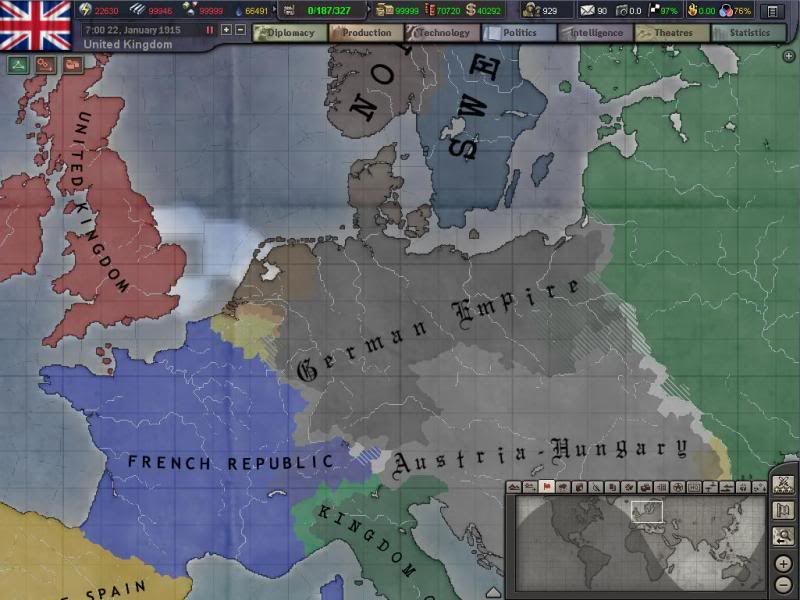
In France the frontline had only moved in Switzerland, where a determined French offensive through the mountains succeeded in finding a gap in the enemy line. French reserves, rushed into the breach, succeeded in keeping it open and getting behind the Central Powers lines, causing a collapse of their front. Switzerland as a whole fell and French troops crossed the border into the Austro-Hungarian Tyrol despite fierce resistance.
Winter was setting in, slowing offensive action. While the elite French mountaineers continued their fearsome attacks against their foes, most of whom were simply not equipped to fight in the terrain, the majority of the line had settled into winter trench routines.
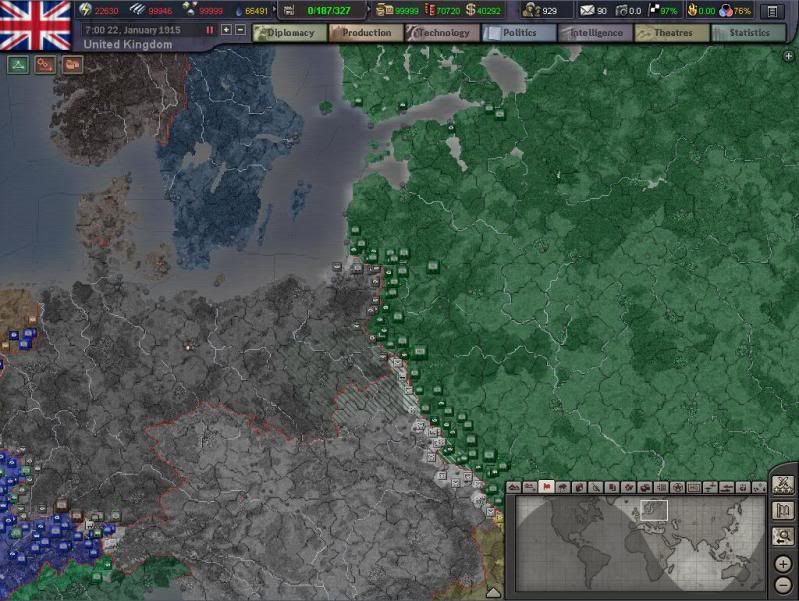
The Russians had been forced out of Poland, as consistent and heavy Central Powers pressure caused the lines to buckle. The retreat was orderly, with the Russians giving ground in deliberate withdrawals and costing their enemies dearly. One Corps was lost to captivity after the local Russian Army commander withdraw from a province, thinking his rearguard action over, forgetting about a single Corps that had not yet crossed his lines. The poor Russians showed up to their withdrawal point to find the Germans already there.
With the harsh Russian winter setting in, both sides dug in and issued their greatcoats: no great offensives would happen in this weather.
Operation Achaicus
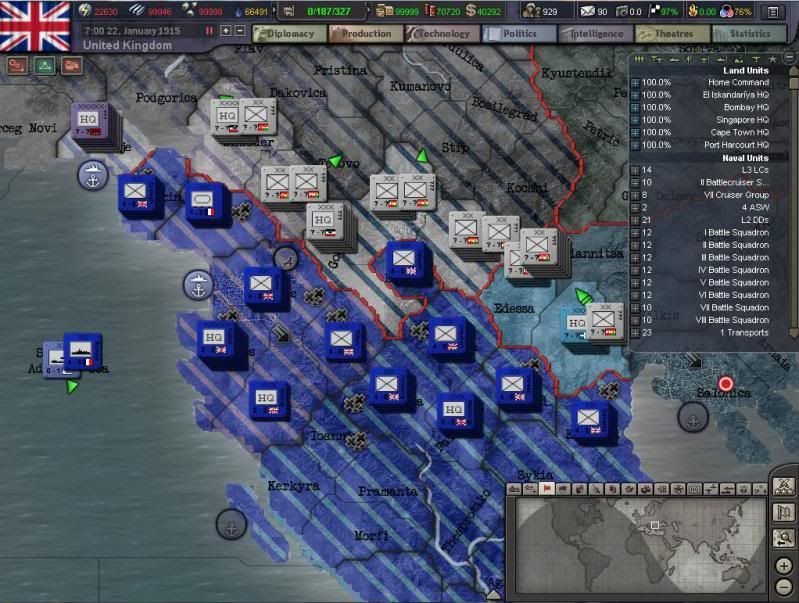
Note to readers: The French player handled this operation with British troops because he was fairly idle whereas I was making ready for Ottoman entry to the war.
2 British Armies, plus some augmenting units and some accompanying French forces, landed in neutral Greece to threaten the Austro-Hungarian south and the Ottoman capital. With significant naval support their landings were successful, with Athens and Tirane quickly falling. British forces advanced against disorganised Greek troops who were expecting to fight enemies from the North: the majority of Greek defences simply did not have south-facing positions, and as such the British forces quickly overran them.
Austro-Hungarian forces were quick to respond, halting the British advance in northern Greece whilst Ottoman forces invaded Bulgaria. The lines settled in Albania and Northern Greece, with the Greeks holding out around Salonica, linked with their Austro-Hungarian allies through occupied Serbia and Bulgaria.
An Austro-Hungarian effort to break the Allied naval supremacy around Greece and Albania was met by British Battlecruisers and French Battleships:
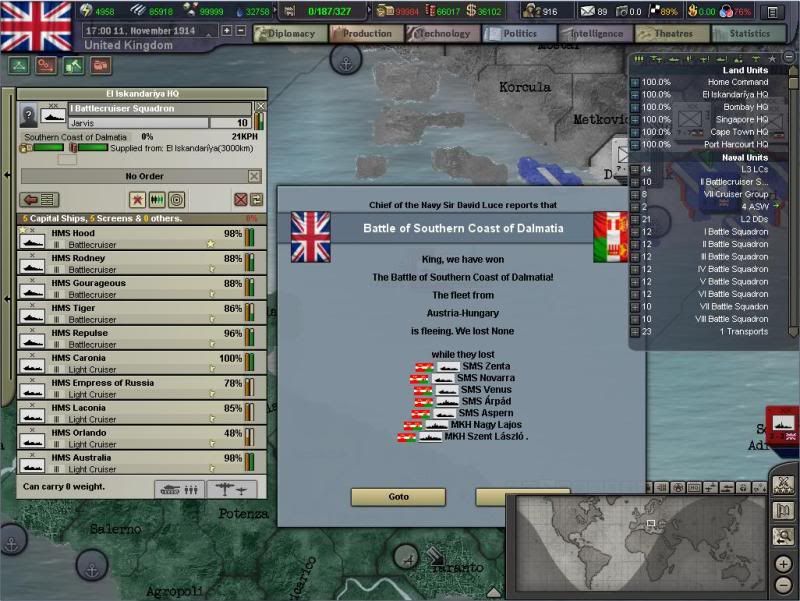
Operation Alexander
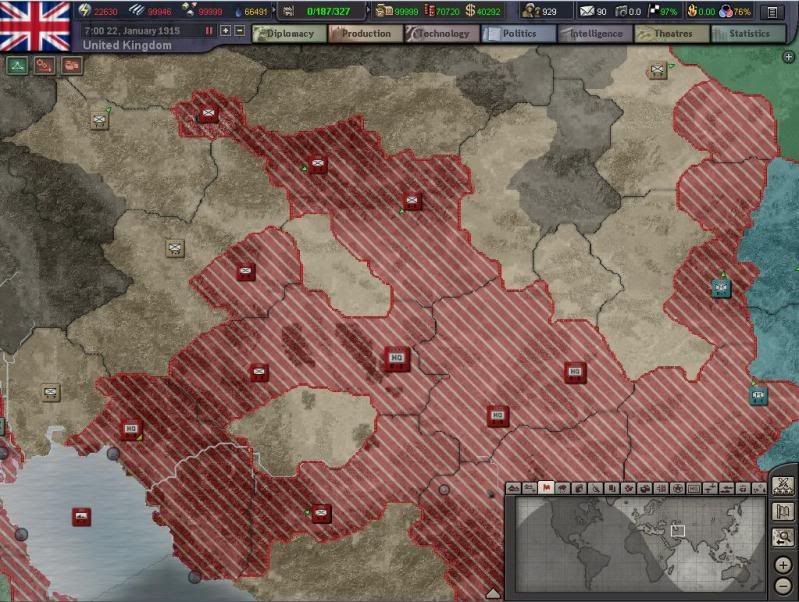
2 British Armies formed Army Group Mesopotamia and were tasked with conducting operations in Ottoman-held Iraq. Persia was also to be invaded to destabilise the Ottoman flank and link with Russia.
The difficult terrain of Persia made for slow but steady going: the Persian Army was swiftly swept aside and is on the brink of surrender, with British forces attacking the final points of resistance.
Ottoman forces are reported to have dug in along the Persian border, ready to meet the British forces coming through Persia from behind formidable prepared defences.
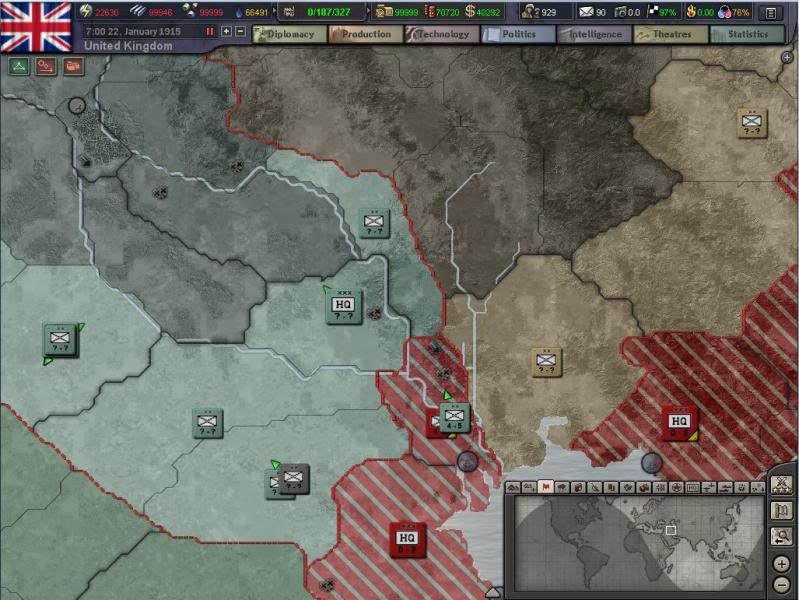
The British attack on Iraq was conducted from the sea and from the land, with an Army striking the ports and advancing up the coast of the Arabian Peninsula. Ottoman defenders were driven back from the ports with relative ease, occupying positions inland. A German expeditionary force arrived and counter-attacked in force, forcing the initial British inland advance back onto the better defended ports, where the German advance was halted.
Operation Pompey
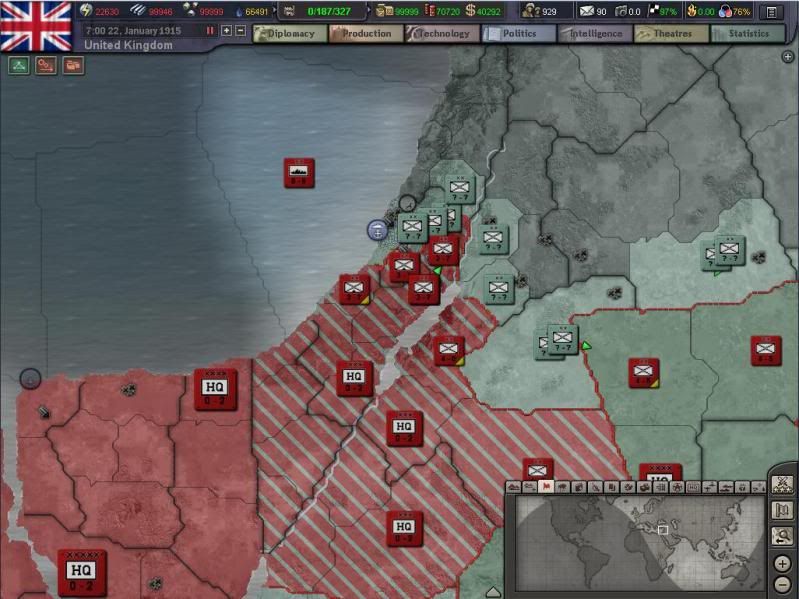
From the British-held province of Egypt and the Sinai Desert, a large British force surged across the border into Ottoman Palestine. Initial defensive positions were quickly overrun, with the Ottomans falling back to prepared positions around the cities of Tel Aviv and Jerusalem, which proved difficult to break.
The British attempted to flank around the Dead Sea to threaten the Ottoman lines along the coast, but this was anticipated and Ottoman reserves quickly deployed to the area and halted British advances, digging in as they did so.
Despite this, British pressure on the coastal areas was kept up, with formidable British battleships bombarding enemy positions from the coast.
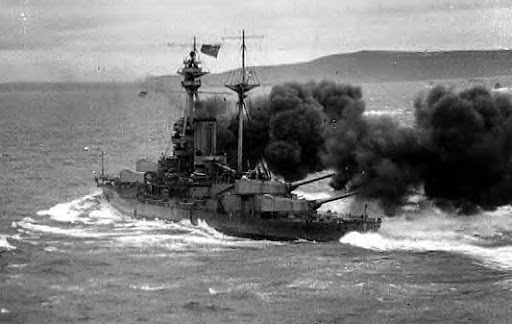
A smaller British warship firing on Ottoman positions near Tel Aviv and Jerusalem
A major offensive by British forces failed to capture Tel Aviv, but succeeded in capturing Jerusalem and Ramallah, threatening the flanks of Tel Aviv and advancing the front past the Dead Sea.
The Channel Dash
In October, the Danish Navy attempted to run the English Channel in order to attack allied shipping in the Bay of Biscay and central Atlantic Sea.
Sailing under the cover of dark, they succeeded in bypassing the British Battleship squadrons at Dover and Calais, but were sighted by patrols from Cornwall. A reserve cruiser unit engaged the Danish Battleship squadron with bravery until the Dover Force of 6 Battleships arrived behind the Danes and gave battle. The Danish force attempted to retreat up the Channel to safety taking heavy losses, only to be intercepted off Holland by additional British Battleships: the alarm caused the mobilisation of much of the North Sea Fleet, fearing the Danish ships were the vanguard of a German armada. This was not the case, and resulted in the poor Danish sailors being engaged by no less than 18 British battleships in 3 Squadrons as they attempted to make their escape. None survived.
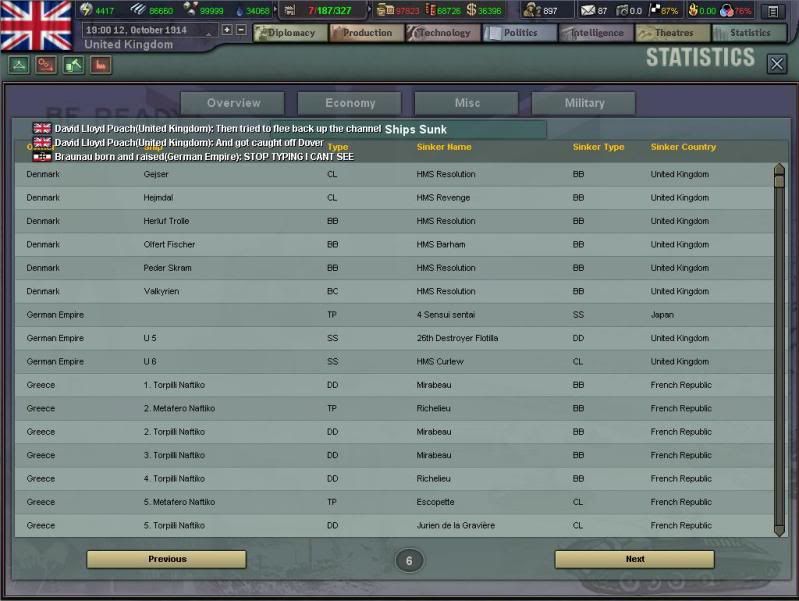
The Danes suffered heavily.
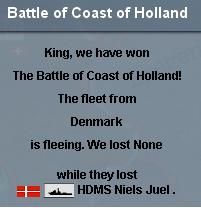
The pride of the Danish Fleet was the last ship afloat, and the last ship to sink.
Note: I apologise for the below attachment. I cannot find the option to delete it. I just used img tags because as an attachment the image was tiny.
As 1914 drew to a close and the harsh winter set in, the existing fronts settled.

In France the frontline had only moved in Switzerland, where a determined French offensive through the mountains succeeded in finding a gap in the enemy line. French reserves, rushed into the breach, succeeded in keeping it open and getting behind the Central Powers lines, causing a collapse of their front. Switzerland as a whole fell and French troops crossed the border into the Austro-Hungarian Tyrol despite fierce resistance.
Winter was setting in, slowing offensive action. While the elite French mountaineers continued their fearsome attacks against their foes, most of whom were simply not equipped to fight in the terrain, the majority of the line had settled into winter trench routines.

The Russians had been forced out of Poland, as consistent and heavy Central Powers pressure caused the lines to buckle. The retreat was orderly, with the Russians giving ground in deliberate withdrawals and costing their enemies dearly. One Corps was lost to captivity after the local Russian Army commander withdraw from a province, thinking his rearguard action over, forgetting about a single Corps that had not yet crossed his lines. The poor Russians showed up to their withdrawal point to find the Germans already there.
With the harsh Russian winter setting in, both sides dug in and issued their greatcoats: no great offensives would happen in this weather.
Operation Achaicus

Note to readers: The French player handled this operation with British troops because he was fairly idle whereas I was making ready for Ottoman entry to the war.
2 British Armies, plus some augmenting units and some accompanying French forces, landed in neutral Greece to threaten the Austro-Hungarian south and the Ottoman capital. With significant naval support their landings were successful, with Athens and Tirane quickly falling. British forces advanced against disorganised Greek troops who were expecting to fight enemies from the North: the majority of Greek defences simply did not have south-facing positions, and as such the British forces quickly overran them.
Austro-Hungarian forces were quick to respond, halting the British advance in northern Greece whilst Ottoman forces invaded Bulgaria. The lines settled in Albania and Northern Greece, with the Greeks holding out around Salonica, linked with their Austro-Hungarian allies through occupied Serbia and Bulgaria.
An Austro-Hungarian effort to break the Allied naval supremacy around Greece and Albania was met by British Battlecruisers and French Battleships:

Operation Alexander

2 British Armies formed Army Group Mesopotamia and were tasked with conducting operations in Ottoman-held Iraq. Persia was also to be invaded to destabilise the Ottoman flank and link with Russia.
The difficult terrain of Persia made for slow but steady going: the Persian Army was swiftly swept aside and is on the brink of surrender, with British forces attacking the final points of resistance.
Ottoman forces are reported to have dug in along the Persian border, ready to meet the British forces coming through Persia from behind formidable prepared defences.

The British attack on Iraq was conducted from the sea and from the land, with an Army striking the ports and advancing up the coast of the Arabian Peninsula. Ottoman defenders were driven back from the ports with relative ease, occupying positions inland. A German expeditionary force arrived and counter-attacked in force, forcing the initial British inland advance back onto the better defended ports, where the German advance was halted.
Operation Pompey

From the British-held province of Egypt and the Sinai Desert, a large British force surged across the border into Ottoman Palestine. Initial defensive positions were quickly overrun, with the Ottomans falling back to prepared positions around the cities of Tel Aviv and Jerusalem, which proved difficult to break.
The British attempted to flank around the Dead Sea to threaten the Ottoman lines along the coast, but this was anticipated and Ottoman reserves quickly deployed to the area and halted British advances, digging in as they did so.
Despite this, British pressure on the coastal areas was kept up, with formidable British battleships bombarding enemy positions from the coast.
A smaller British warship firing on Ottoman positions near Tel Aviv and Jerusalem
A major offensive by British forces failed to capture Tel Aviv, but succeeded in capturing Jerusalem and Ramallah, threatening the flanks of Tel Aviv and advancing the front past the Dead Sea.
The Channel Dash
In October, the Danish Navy attempted to run the English Channel in order to attack allied shipping in the Bay of Biscay and central Atlantic Sea.
Sailing under the cover of dark, they succeeded in bypassing the British Battleship squadrons at Dover and Calais, but were sighted by patrols from Cornwall. A reserve cruiser unit engaged the Danish Battleship squadron with bravery until the Dover Force of 6 Battleships arrived behind the Danes and gave battle. The Danish force attempted to retreat up the Channel to safety taking heavy losses, only to be intercepted off Holland by additional British Battleships: the alarm caused the mobilisation of much of the North Sea Fleet, fearing the Danish ships were the vanguard of a German armada. This was not the case, and resulted in the poor Danish sailors being engaged by no less than 18 British battleships in 3 Squadrons as they attempted to make their escape. None survived.

The Danes suffered heavily.

The pride of the Danish Fleet was the last ship afloat, and the last ship to sink.
Note: I apologise for the below attachment. I cannot find the option to delete it. I just used img tags because as an attachment the image was tiny.
Attachments
Last edited:
Session Four: Bloodied Bear
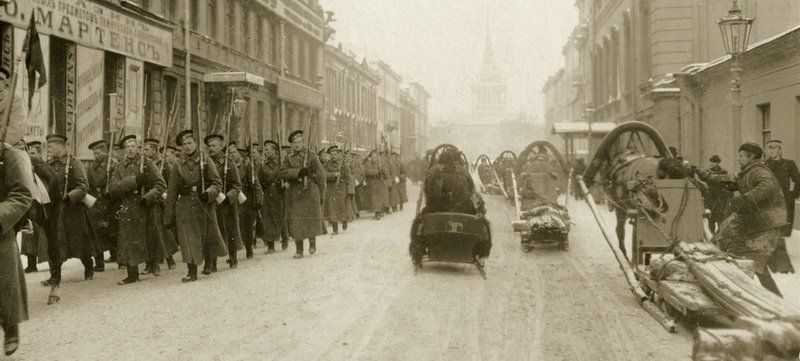

In Russia: We are a nation of peasants
When the war started, we were a nation eager for war, confident in what seemed an assured victory over the Germanic heathens. We knew we were out-matched technologically and in training, but the Russian does not lose heart easily. Our industry despite lacking enough manufacturing facilities turned-to and delivered all and more of what the Tsar required. Our men were equipped as rapidly as possible with the most up-to-date tools of war and we made sure that no man serving would suffer the same shortcomings that his forerunners did against the Japanese.
IC was slotted especially to the refitting of our troops and by sessions end the refit had been nearly completed. To do this the French Republic; now the most powerful economy in Europe was sending a tremendous number of supplies everyday.
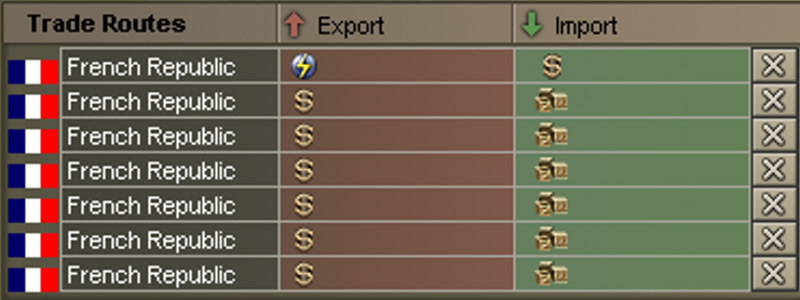
Several hundred units per day arrived to compensate for our shifted IC and several hundred more supplies per day are promised. The gratitude this nation has for the people of France can never be adequately expressed.
We are a nation of peasants. We may not have the finest railroads in the world, or the finest factories and we may not have the greatest navy or most glamorous of armies. No, we are a nation of peasants and there are millions upon millions of us who can brave the winter storms while German and Austrian city dwellers shiver in fear. Winter has come and from the eastern steppes a resolute population of peasants will not waiver and will strike hard at the enemy. No matter the cost.
The Imperial Russian Navy:


The Ottomans came into the war with shots fired by German ships, crewed by German sailors, captained by German officers flying a treacherous Crescent Flag. Soon after though, the momentarily resolute "Ottoman" fleet retired to port and left the entire Black Sea coast to our fleet.
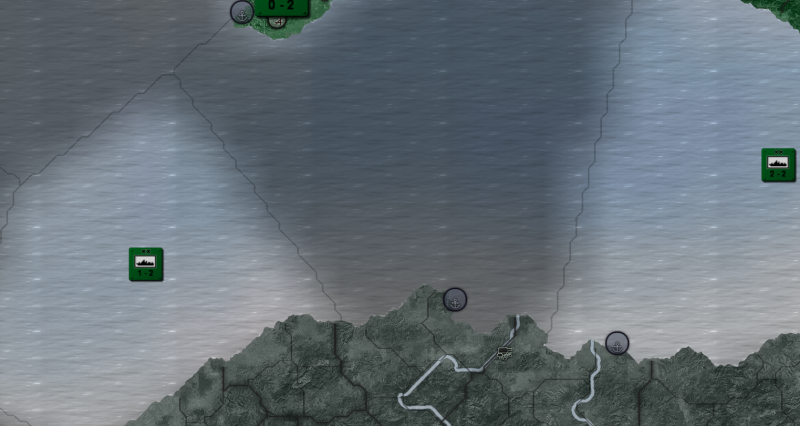
Russian pre-war dreadnoughts fired shells in support of the battle and subsequent withdrawal from Batumi. The rest of the session was spent bombarding coastal villages that sought to inform the Turk on our movements. We are eager for the Turk to put to sea, it shall be another Chesma.
The Imperial Russian Army:
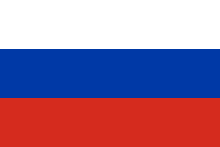

We remember the 1st Corps of the 1st Army of the Poland Front. All men and material were lost in rearguard actions during the collapse of the Poland pocket. This corps sacrificed itself so that the remaining 4 corps of the 1st Army along with the entire 2nd and 3rd armies could withdraw to the Brest Litovsk line.
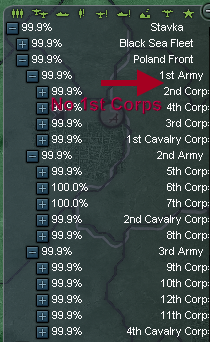
This Corps fought in the assault on Krakow and the defense of Lodz and was ultimately cut off and lost before it could reach the Warsaw line. This was one of the pre-war corps, the first of the first and a great blow has been dealt to us with this loss.
The Fronts:
Carpathians:
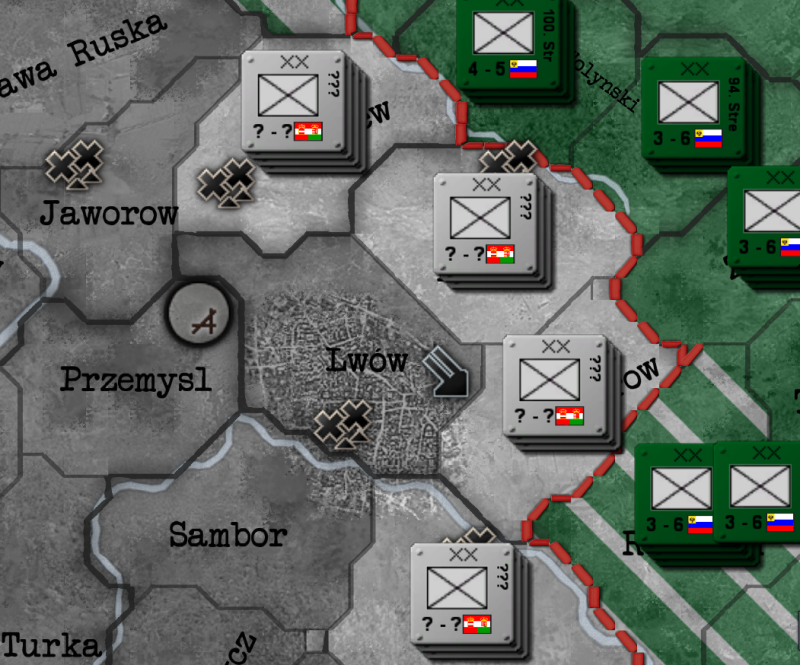
At present we are digging-in across from the Austrians as they decided to construct trenches as soon as possible along their line. We are doing the same. A handful of failed offensives in the Lwow area kept both sides on their toes but to be honest. It may take a monumental and probably futile effort to move this front. The screenshot is just of the Lwow area, but the entire front with Austria looks this way. They are being spread thin by other allied attacks and we are too disorganized to launch any meaningful offensives. Also, winter is creeping over the front. Most of Russia is frozen.
The Caucasus:
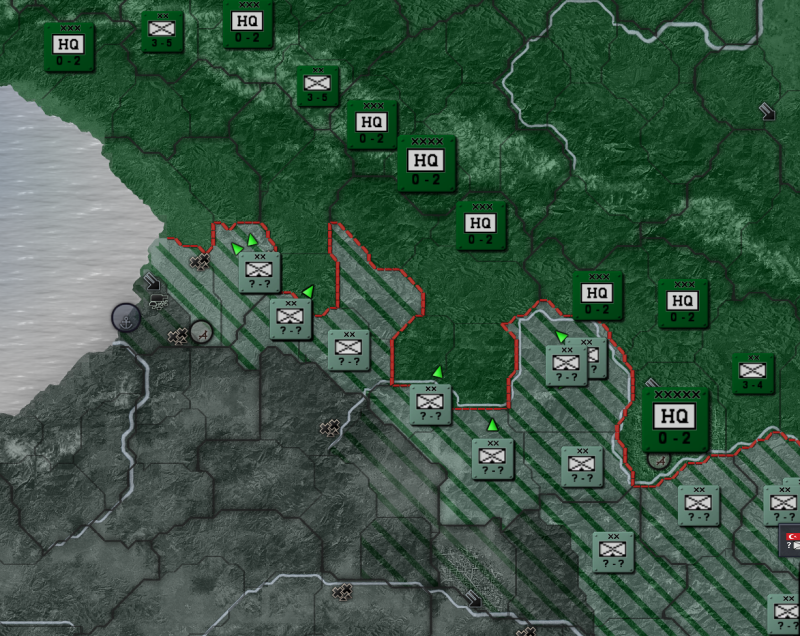
The Turk finally came into the war, and as we knew we would be, we were utterly unprepared. Actions were fought in Batumi and Yerevan but from the start we sought to draw the enemy deeper into our territory. For a time this seemed likely, but soon the Turk could not keep up with our strategic withdrawal. Luckily for us, the Turk lacked sufficient cavalry and could not turn our flank and the line now sits with the fortified city of Tblisi at its center. At the start of the campaign we were not able to even fill in the front. Heroic actions by the British have drawn off troops from this front, or perhaps the Turk saw that there were too many mountains and too many Russians willing to shoot and then run away. This front like the Carpathian one is now a static droll. The Turk is digging trenches and so are we. Mountains and trenches and not enough men on either side. Doubtful this picture will change much until the end of the war. However, new troops are being raised, and they are already plugging this line, perhaps even more could be sent here to gain an opening.
Northern Finland:
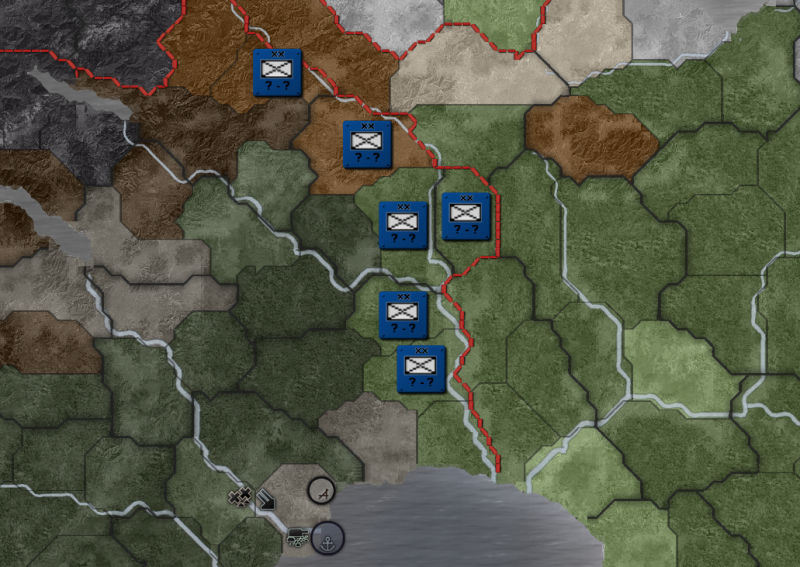
The Swedes are still neutral...
East Prussia:
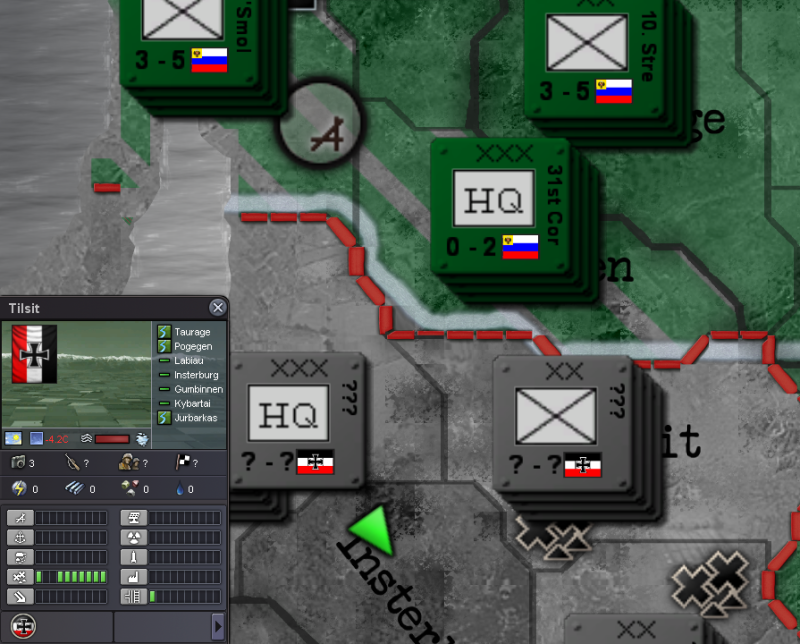
The greatest battle again was fought at Tilsit. Our Cossacks were driven away from the Old Prussian Seat and the German launched several sustained attacks at Tilsit where due to get even more over-stacking penalties and insufficient reserves, we lost the province.
Our greatest victory was in the defense of Memel. While the whole front seemed to be in jeopardy, the German Navy gave the German Army a substantial advantage along the Baltic Coast. After the relief of Königsberg and the recapture of Tilsit, the German Army sought to make further gains against the troops still dug in on German soil.
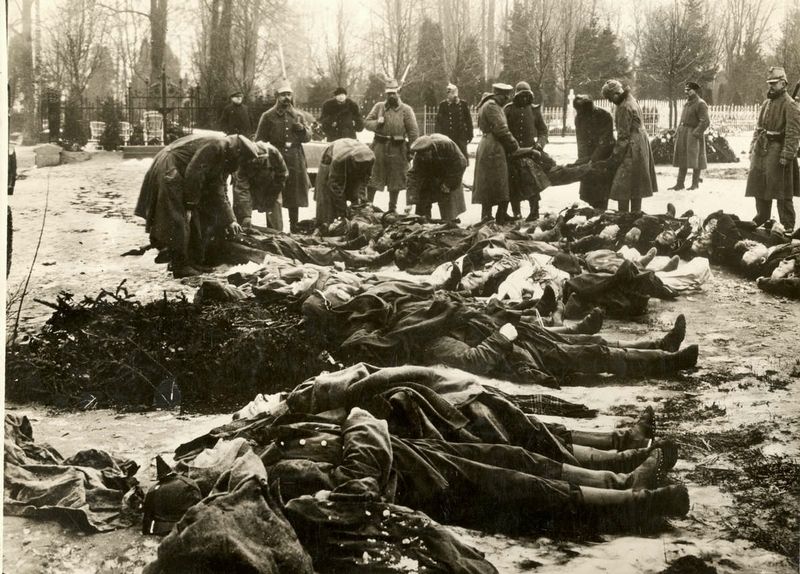
Several thousand German soldiers and officers were killed along the riverbank and along the sea shore. Our troops endured a merciless bombardment from large caliber German Naval Guns, but effective rotation gave us the victory and stalled all hopes of the Kaiser to drive up the Baltic Coast. But no worry, we are gracious hosts to our captives.
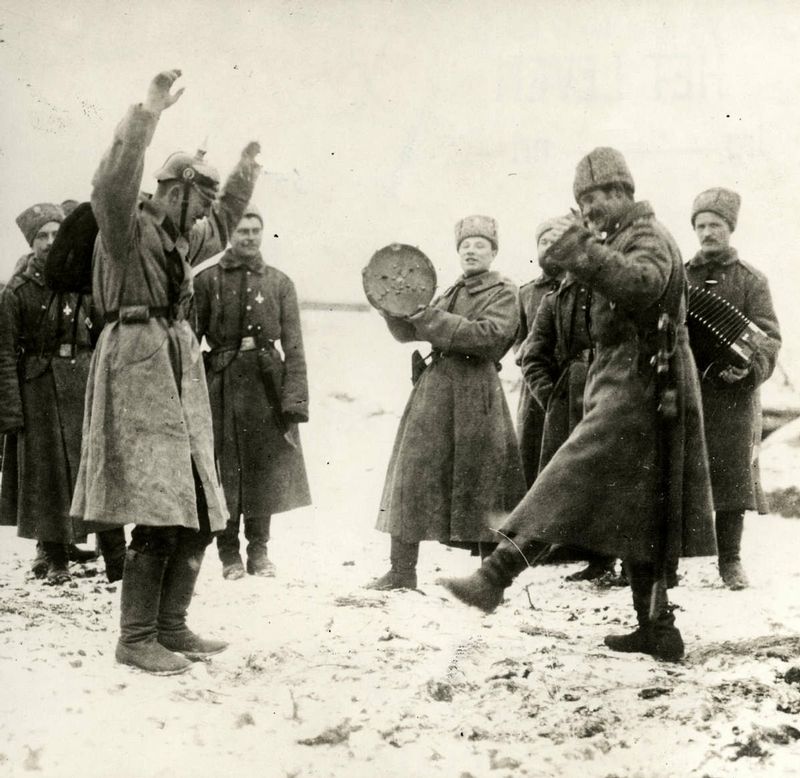
The Collapse of Poland:
At the close of the previous session, the three armies in Poland were gaining strength and digging in to prepare for later offensives. The assaults into Austria-Hungary had failed due to underestimating our opponent and relying on brute force over effective rotation. These Austrian units now threatened the southern Polish border and began to hammer this line. The northern border had been conceded to the Germans in favor of a more defensive line. The problem with this strategy was that it relied on the enemy ignoring this salient and allowing us to launch attacks from it. We had dispatched French armored cars to toughen the interior lines but these unit would not arrive in time. However, an even larger problem showed itself upon engagement. Russian troops were far too many in far too little space. We had not believed the Central Powers would focus on the salient and as such we did not build defense in depth. Truthfully, the 3rd army should have been removed from the salient and used as a reserve or even an attacking force into East Prussia. Russian troops suffered terribly, almost unimaginable penalties from over-stacking. It soon became clear that we would not be able to hold the salient and that we needed to withdraw, but that would become a costly and difficult affair.
Stage 1 of the Withdrawal:
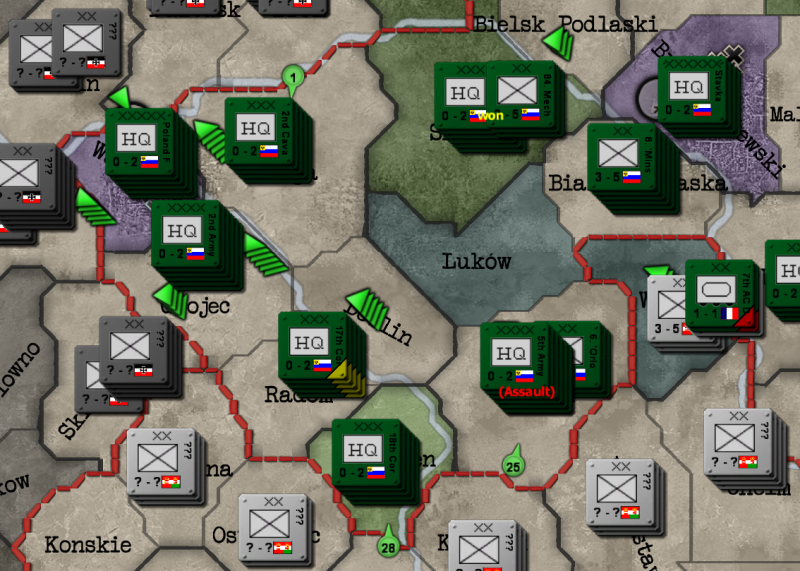
Central Powers troops engaged on nearly every possible front and held down troops. Slowly but surely we were able to withdraw from the Lodz line to the Warsaw line. However the Warsaw line would not hold for long. It is believed that the 1st Corps was lost in this action somewhere south of Warsaw.
Stage 2 of the Withdrawal:
Originally we had hoped to dig in at the Warsaw line, but again the over-stacking prevented this and we sought to group up west of the fortress-city of Brest-Litovsk. The goal was to take the majority of troops behind Brest-Litovsk and build substantial, no, impenetrable reserves in front of the city while the main line held the marshes to the south and southwest.
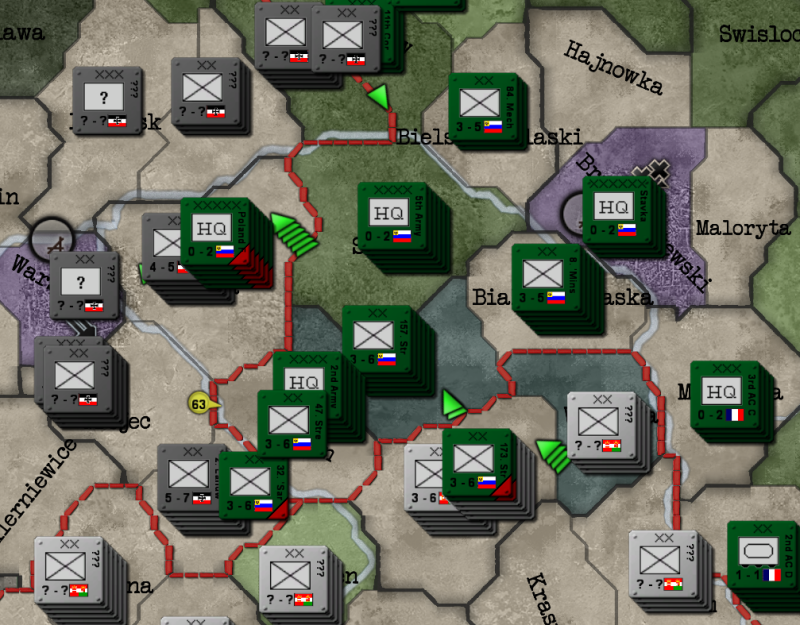
Stage 3 of the Withdrawal:
The Austrians beat us out of the marshes as the only units available were French Armored Cars and they could not hold the line, even with added infantry support. We instead built a reserve behind this position but it too collapsed as the reserves were too plentiful and over-stacking caused a route of our forces and we withdrew to the line at Brest-Litovsk.
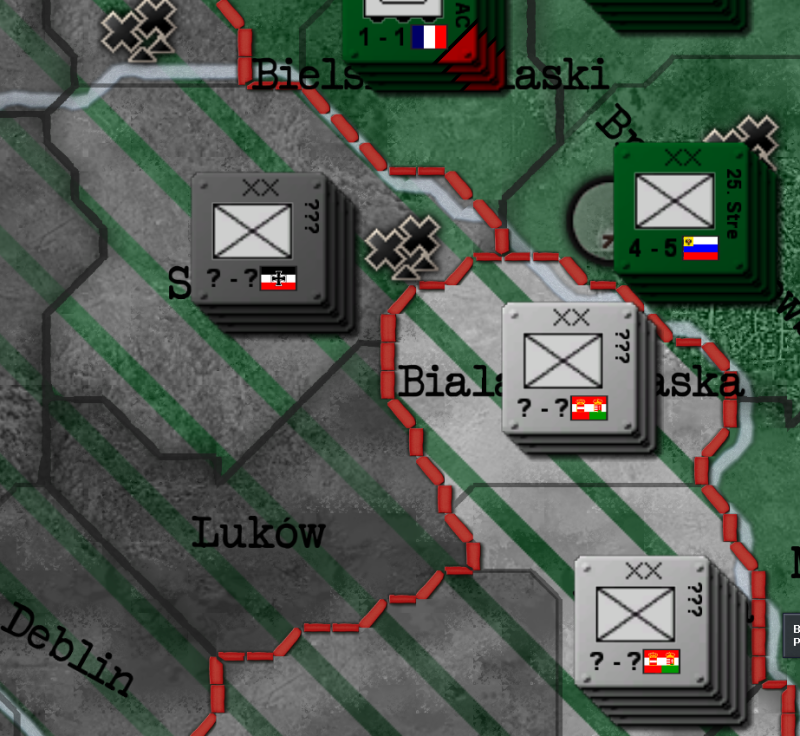
As far as we can tell, once we were able to organize effective resistance and appropriate defense-in-depth with substantial reserves, the Central Powers offensive stopped cold. We shall all dig in and take pot-shots at one another over the river. What once was an attempt at unrivaled glory is now a stalemate and the Tsar is frustrated.
This is the Poland Salient now. A flat border with two sides dug in on riverbanks with no hope of moving further. Surely both sides have significant defense in depth and ample reserves. We believe the Central Powers are focusing elsewhere now as our front wasn't at all active after their offensive ground down.
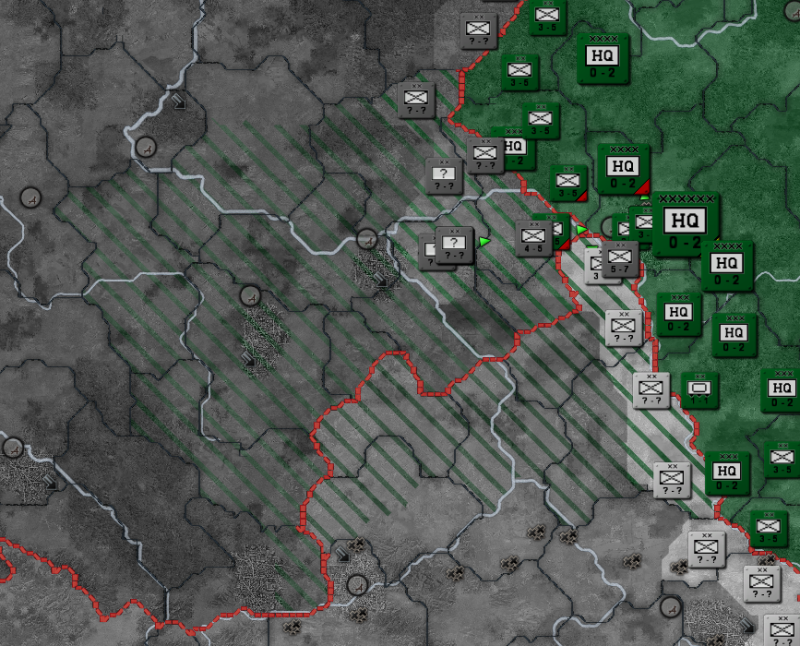
To highlight the panic that the withdrawal caused, one need only look at the disorganization of the 3rd Army.
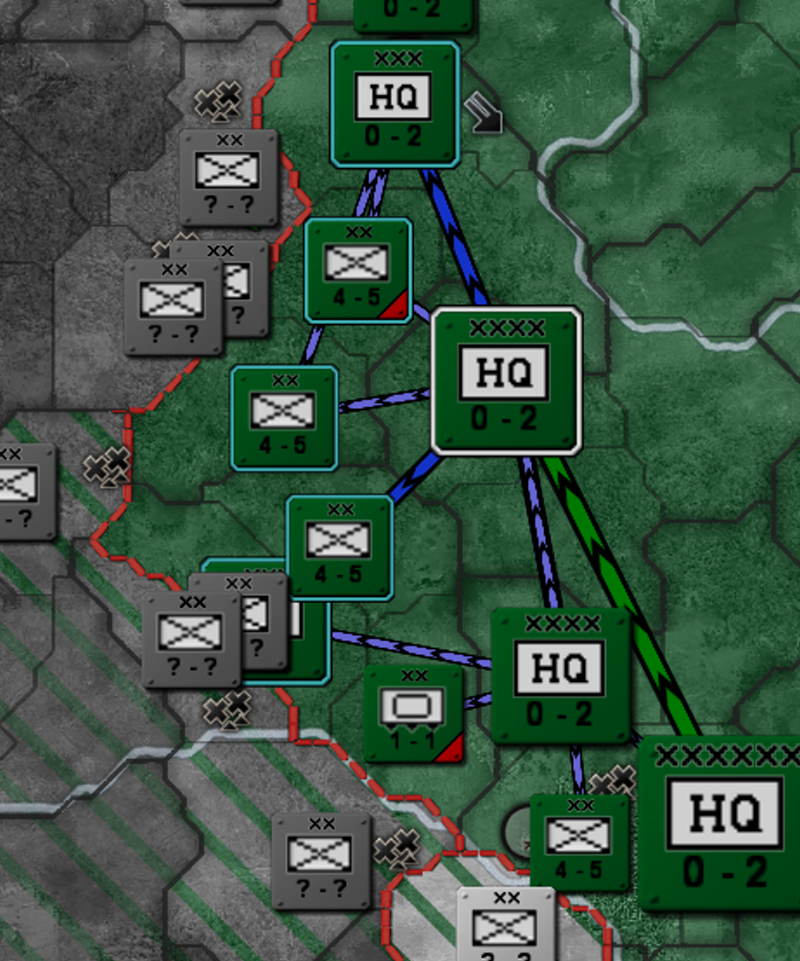
Several divisions are spread out all along the new front. The 3rd is probably the worst or the three armies apart from the 1st that lost it's leading corps, but the 1st and 2nd armies are all well established in their own areas of operations.
There is an advantage to this debacle though. We have reserves. Lots and lots of reserves. The defense-in-depth along the border is complete and Stavka has not even begun to determine what troops can be freed up for actions elsewhere. One look at the Brest-Litovsk reserve marshaling area and it is clear that the Tsar's troops will not just be sitting in frozen trenches forever.
Overall Picture:
The fronts are incredibly static already and they will only get worse. Poland was scary for a bit as I really felt I was going to lose it, but I beat off several attacks and now my troops are digging in and reserves will make it nearly impenetrable. The Austrian front is so long and the border has a natural defense, I don't really know if I can break through the line there if the Austrians can dig in. Poland will be the decider, but I am confident that sufficient reserves and digging will keep the salient intact.
Quick snapshots of the Germans and Turks show that we are still in good shape for the war. The Austrians are still effectively beating our spies, but that's what allies are for.


***
Russia is not beaten, not at all. There was not a Tannenberg and the front did not collapse. Only a corps was lost and while this is disheartening, it could have been far worse had we not been as proficient. The defeats of the Tsar's armies can largely be laid at the blame of the player. I am relatively new to HOI3 as I never really cared for its system. I have been playing Paradox titles for over a decade, so I'm well aware of the penalties. I did not give credit to the Austrian player as he struggled against the Serbian AI and I did not believe the German player would focus on me. I have learned my lessons and Russia will be in a better position to have a positive effect. Russia will not be relying on pointless and heavily-penalized mass tactics any longer. The UK is properly in the war and surprisingly, the Swiss Front has opened for France. Also the Italians will most certainly be in the war in the next game.
The Navy build will most likely be cancelled until a time when we no longer need IC, so, cancelled permanently. Current production has shifted to trenches while there are probably 1,000,000 men in training in the queue. Come the Spring, Russia should have several new formations ready for battle. And the Entente is looking for new "Aces" to play.
****
Written under the influence of the fabulous GranRojo 2011 Tempranillo-Cabernet-Sauvignon. My 1st Corps! I shall avenge you!
Last edited:
Allez! Allez! Marchez, les grenouilles!
Warning: large update
The war was last viewed from the French perspective as follows: bogged down in Alsace-Lorraine, fighting in Spain, and stalled in Switzerland. However, France stood at the top of Europe's industrial powers and was overflowing with men to use against the Central Powers.
The opening French offensive was against the center of the German line at Schirmeck, to retake our lost salient. The assault involved 64,000 French against the dug-in German force of four divisions, presumably at 32,000 men, but these men were holding a recently seized piece of land and it was flat, with no defensive advantages. The intention was to put pressure on the Germans wherever possible, as the Russians were getting hammered. The French would eventually win the battle, with only 1,000 casualties take on each side.
The French central theater was supposed to have been the breakthrough area against the Germans -- specifically in Switzerland. At war's start, the Germans had stopped us dead in our tracks and morale plummeted amongst French leadership. It did not affect the troops, though, who began their own attack against the mountainous region of Schwyz; this assault gave French commanders hope: if Switzerland fell, then the Austrian Tirol and German Bavaria would be open to the Republic and the war could be ended quickly!
While waiting on progress against the Germans and news from the Russians, great news arrived in Paris: Spain collapsed and agreed to give up the war against Portugal. Spain would supply the Republic with the necessities of war and bind itself diplomatically to the Triple Entente, freeing up almost 150,000 French soldiers and at least two corps of British marines. The campaign had only taken two months and was won with only an estimated 10,000 fallen soldiers, whose sacrifice will not be forgotten. It was now hoped that the Spanish soldiers would man the lines in Belgium against the German onslaught.
In early October, the BEF was shipped out from Toulon to Greece. Intelligence reported that the Greeks were going to be conquered by the Ottoman Empire, so France was going to defend it. A minor problem arose when the BEF tried to disembark on Athens and then the Greek government declared war . . . so we continued to garrison the country anyway. The landings in Athens also saw Crete simultaneously assaulted and then an assault took place on Salonika. The attack in the north would fail, but the troops would safely retreat to transports.
In Switzerland, winter was a reality and it was believed that nothing could happen. Neither side seemed willing to move and even the other Entente members thought that the winter would stall both sides from fighting. The Republic used this time and common held belief to transport men and get ready to launch an assault south of Zurich, which would then allow the French Army to pressure the last Swiss VP and collapse the country.
In the morning of October 21, 1914, the French decided to garrison Albania to fight against the Central Powers. Albanian soldiers acted as oddly as the Greek ones did and started firing on French forces. This lead to an awkward situation, with French soldiers on both sides of Tirane and so a general siege began on the Albanian capital. The Central Powers were not reacting very well to either the Albanian or Greek occupations, although Austro-Hungarian soldiers were spotted at one point nearby.
On October 30, the Ottoman Empire formally declared war. The Triple Entente was not surprised and had already positioned fleets off of the coast of the Ottomans. The only concern was that they would relieve the Greek and Albanian forces who were still mistakenly trying to fight the BEF. The Ottomans would add even more industrial might and soldiers against us, though.
On November 2, the BEF finally secured Tirane and just in the nick of time! Austro-Hungarian divisions were attempting to enter the city when the were met by withering gunfire from the BEF's Indian and Highland soldiers. Despite the subtle or not so subtle racism which was common in these days, both the Scots and the Indians fought together in an amazing effort against the Austro-Hungarians and held them off.
In November, the Iberians were deep into France and were streaming across the country toward Belgium, where they were to serve against German forces in that sector. Although they were using French supplies, the Republic did not mind as it had far too much industrial might and needed something for the factories to produce. As the war drags on, French factories would increasingly switch to naval, supply, and engineering works for the whole of the Entente.
By the end of the first week of November, the whole BEF was in the Balkans. By nearly the 9th, it was pushing the Central Powers away from Tirane and into the outskirts of Gostivar. This area was also given priority for trench networks and port facilities, with both being developed in and around Tirane for supplying such a huge force. The province of Lezhe, north of Tirane, was also being seized by Austro-Hungarian soldiers in an attempt at encircling the BEF corps in the north.
Following the BEF's invasion of coastal areas far north of Tirane in Austria's Slavic land, the Austro-Hungarian navy was the source of much criticism within the Central Power's councils. This directly lead to the Austro-Hungarian Navy sallying from the ports to try and stop the French naval blockade. The first battle occurred with the Austro-Hungarian fleet facing off against six 1910 dated light cruisers -- the result was the loss of an enemy battleship and a badly mauled French picket fleet, which had protected the three transports assigned to it. This was followed by another naval battle where a British BC squadron pinned the Austro-Hungarian navy while the French dreadnoughts moved up, ending in total disaster for the Central Powers. This would allow the French fleet to guard other areas of the Mediterranean!
In preparation for the fall of Switzerland, a new army of 120,000 men was placed in the country. It would move up to man the front against Germany in a defensive posture while the mountain troops of France pushed forward. It would also place some garrisons along a line of supply and in Bern, to keep partisans from interfering with operations. Pinning assaults were launched all along the front as French soldiers went forward with the main assault in Zurich.
In late December, the area south of Zurich and the Swiss Italian border saw French occupation and the repulse of Central Power forces. The goal was the fall of Zurich and then hopefully a push toward Vienna. The Swiss operation was massively important the Entente's morale -- little successes were being had elsewhere and the BEF was being absolutely hammered in the Balkans. Success here would likely draw reserves from other fronts. Also, not shown, is Bulgaria falling to the Ottomans.
Once Zurich fell, French forces kept pressing forward, regardless of winter conditions. The Austrian border was reached and the Central Powers appeared to be reeling, giving the Entente a great morale boost. Portugese troops also showed up to help garrison the region.
The province of Lezhe was the focal point of Central Power attacks in the Balkans. The Central Powers would take it, but be immediately pushed out by French naval gunfire and BEF land forces. Thousands died in the back and forth exchange, with both sides dying in droves.
With the British launching a full offensive against the Ottoman Empire, French forces (freed up from Spain and organized) were dropped off in Crete and sent over to land near Damascus and Beirut. If done correctly, it will stop Ottoman supplies, draw enemy forces and allow the Brits to push, or force the Ottomans to fall back entirely.
At the end of January, the Balkan front had over 400,000 Entente forces -- about 350,000 Brits and 50,000 Frenchmen. The Central Powers had attacked here so ferociously that Republican generals felt confident it did indeed draw reserves away from Russia, giving them breathing room.
In the North, 410,000* French soldiers stood beside Spanish, Belgian, and Portugese forces against Germany. The Netherlands joined the Republic as an ally, but still did not join the war (bug? can't call them to arms...).
In the center, 850,000 Frenchmen are prepared to pay the ultimate sacrifice to stop the Germans from destroying the Republic. Small offensives, with multiple corps exchanging places and attacking, have failed to penetrate any of this front. The generals here are told to dig in and hold out, rather than attack now.
*120,000 of the men shown in the picture are in Switzerland. I put them into the wrong army group.
Summary: French forces having landed in the Balkans, beaten Spain, broke Switzerland, set up in the Netherlands, pushed into the Tirol, and begun an offensive in the Levant. France is shining as an example for the Entente, destined to lead them to victory. This session was quite a bit of fun and also harrowing. I launched a lot of risky amphibious moves using the BEF and Poach (Great Britain) was always there to point out how I was losing his units. :laugh: Also, tanks are worthless and mountaineers rock.
Well, this is certainly interesting. Though it kinda seems like offensives are a lot easier than they were in WWI. Did you change any mechanics/unit scores in order to represent the effect of technology vs. inferior tactics at the time?
And speaking of balance, it seems very wrong that the entente should have parity on the contintent as well as superiority on the oceans. It seems like the central powers are only barely holding the line everywhere, and that's before Spain's forces have even begun making an impact.
It certainly seems wrong, balance-wise, for Frace to be economically superior to Germany after just a few years of production.
And speaking of balance, it seems very wrong that the entente should have parity on the contintent as well as superiority on the oceans. It seems like the central powers are only barely holding the line everywhere, and that's before Spain's forces have even begun making an impact.
It certainly seems wrong, balance-wise, for Frace to be economically superior to Germany after just a few years of production.
France starts the game with some 60 base IC less than Germany (140 vs ~200). The French player has just played his hand very expertly against Germany in two areas:
Firstly he spent the opening year of the game running IC in order to catch up with Germany. He is heavily dependant on the UK for imported resources to run this industry. German GDP in 1914 was some 1.65 of France's GDP, and the starting IC has Germany having roughly 1.43 of France's IC. So yes, maybe France has like 10 more base IC than it should have, but the balance isn't that far off. All you're seeing is the France player making a smart move.
Secondly, the training laws (and indeed all laws) are significantly more influential in this mod than in vanilla HoI3. Specialist Training increases unit recruit time by 35%, and gives a raft of benefits like superior org regain rates and such, and minimal training reduces it by 35%, with a raft of drawbacks such as reduced org regain and horrible (-50%) officer recruitment.
Germany spent 1910-1914 recruiting on Specialist Training, France spent 1911-1914 recruiting on Minimal Training. Lord Romanus then switched back to Specialist Training a few months before the war and dumped leadership on Officer Training to get his ratio right for the war's start.
Germany has close to 3000 manpower, France has none to spare on new armies. The French player should not outnumber Germany, and in 6 months time I bet he won't, but he's stolen a march on the German player on this one because the German player sat on a very bad pre-war law for recruitment. In fairness I did too, because I also failed to notice the impact of the laws, but the France player saw the advantage and he used it, and the result is excellent early-war gains for the Entente before the German player can mobilise his massive manpower reserves.
Additionally, the French player has an Army of Mountaineers in play in Switzerland, the Central Powers use standard Infantry. As in vanilla HoI3, Mountaineers with Mountain Warfare Equipment are the gods of mountain terrain.
What you're seeing isn't so much a balance issue, its more the French player being significantly better at preparing for the war than the Central Powers players.
What I reckon you'll see is a reverse of the historical WW1: instead of a German advance occupying French territory before the Franco-British forces halted their advance, you'll see instead a French advance occupying German territory before German and Austro-Hungarian forces mobilise properly and halt that advance. Instead of historical Germany being better prepared for the war and making the early gains, it is the Entente that is better prepared for the war and will make the early gains.
Germany can spam many more armies, and every passing month sees more and more Germans on the line. It is only a matter of time before he reaches critical mass and we can no longer make advances against him.
As for the Kaiserlich Marine, I'm pretty sure he has one. He's got Capital Ship practical showing on the intel screens. Granted I probably have more ships than he does and France probably has more ships than Austria-Hungary does, but thats again because I focussed on them and Lord Romanus had awesome training laws. If Germany and Austria-Hungary are still building ships, they'll be able to at least contest the waves.
To conclude on my rather lengthy post: Lord Romanus was simply better at preparing than Abbews was, and is reaping the rewards as a result whilst Abbs scrambles to play catch up.
Firstly he spent the opening year of the game running IC in order to catch up with Germany. He is heavily dependant on the UK for imported resources to run this industry. German GDP in 1914 was some 1.65 of France's GDP, and the starting IC has Germany having roughly 1.43 of France's IC. So yes, maybe France has like 10 more base IC than it should have, but the balance isn't that far off. All you're seeing is the France player making a smart move.
Secondly, the training laws (and indeed all laws) are significantly more influential in this mod than in vanilla HoI3. Specialist Training increases unit recruit time by 35%, and gives a raft of benefits like superior org regain rates and such, and minimal training reduces it by 35%, with a raft of drawbacks such as reduced org regain and horrible (-50%) officer recruitment.
Germany spent 1910-1914 recruiting on Specialist Training, France spent 1911-1914 recruiting on Minimal Training. Lord Romanus then switched back to Specialist Training a few months before the war and dumped leadership on Officer Training to get his ratio right for the war's start.
Germany has close to 3000 manpower, France has none to spare on new armies. The French player should not outnumber Germany, and in 6 months time I bet he won't, but he's stolen a march on the German player on this one because the German player sat on a very bad pre-war law for recruitment. In fairness I did too, because I also failed to notice the impact of the laws, but the France player saw the advantage and he used it, and the result is excellent early-war gains for the Entente before the German player can mobilise his massive manpower reserves.
Additionally, the French player has an Army of Mountaineers in play in Switzerland, the Central Powers use standard Infantry. As in vanilla HoI3, Mountaineers with Mountain Warfare Equipment are the gods of mountain terrain.
What you're seeing isn't so much a balance issue, its more the French player being significantly better at preparing for the war than the Central Powers players.
What I reckon you'll see is a reverse of the historical WW1: instead of a German advance occupying French territory before the Franco-British forces halted their advance, you'll see instead a French advance occupying German territory before German and Austro-Hungarian forces mobilise properly and halt that advance. Instead of historical Germany being better prepared for the war and making the early gains, it is the Entente that is better prepared for the war and will make the early gains.
Germany can spam many more armies, and every passing month sees more and more Germans on the line. It is only a matter of time before he reaches critical mass and we can no longer make advances against him.
As for the Kaiserlich Marine, I'm pretty sure he has one. He's got Capital Ship practical showing on the intel screens. Granted I probably have more ships than he does and France probably has more ships than Austria-Hungary does, but thats again because I focussed on them and Lord Romanus had awesome training laws. If Germany and Austria-Hungary are still building ships, they'll be able to at least contest the waves.
To conclude on my rather lengthy post: Lord Romanus was simply better at preparing than Abbews was, and is reaping the rewards as a result whilst Abbs scrambles to play catch up.
Last edited:
Ooh, I see.
Then Kudos to the French player, I suppose!
I really wasn't intending to complain, in any case, but since this is supposed to be a playtest, I thought I'd give some beedback.
Then Kudos to the French player, I suppose!
I really wasn't intending to complain, in any case, but since this is supposed to be a playtest, I thought I'd give some beedback.
So will the Russian Revolution be simulated? And are Russian VP's re-balanced to make capitulation easier?
The gains made by Germany and Austria-Hungary as a result of the Treaty of Brest-Litovsk are present as the Central Powers wargoal on Russia, but there are no Revolution events. The Russian player is operating under his own house rule (I believe if Kiev, Tallinn and another city which I forgot falls, he'll capitulate).
As I've stressed throughout, this is a work in progress mod and this MP game is to test balance on the major factions. It is not finished, flavour events and specific historical occurances are not all modelled. We'll get round to that when we know the major powers are actually balanced.
This MP will likely be decided before the historical Russian Revolution anyway.
As I've stressed throughout, this is a work in progress mod and this MP game is to test balance on the major factions. It is not finished, flavour events and specific historical occurances are not all modelled. We'll get round to that when we know the major powers are actually balanced.
This MP will likely be decided before the historical Russian Revolution anyway.
Many thanks to this collaborative AAR and to the writers taking time to post updates.
Really curious about how the russian revolution will be implemented by the player.
Really curious about how the russian revolution will be implemented by the player.



